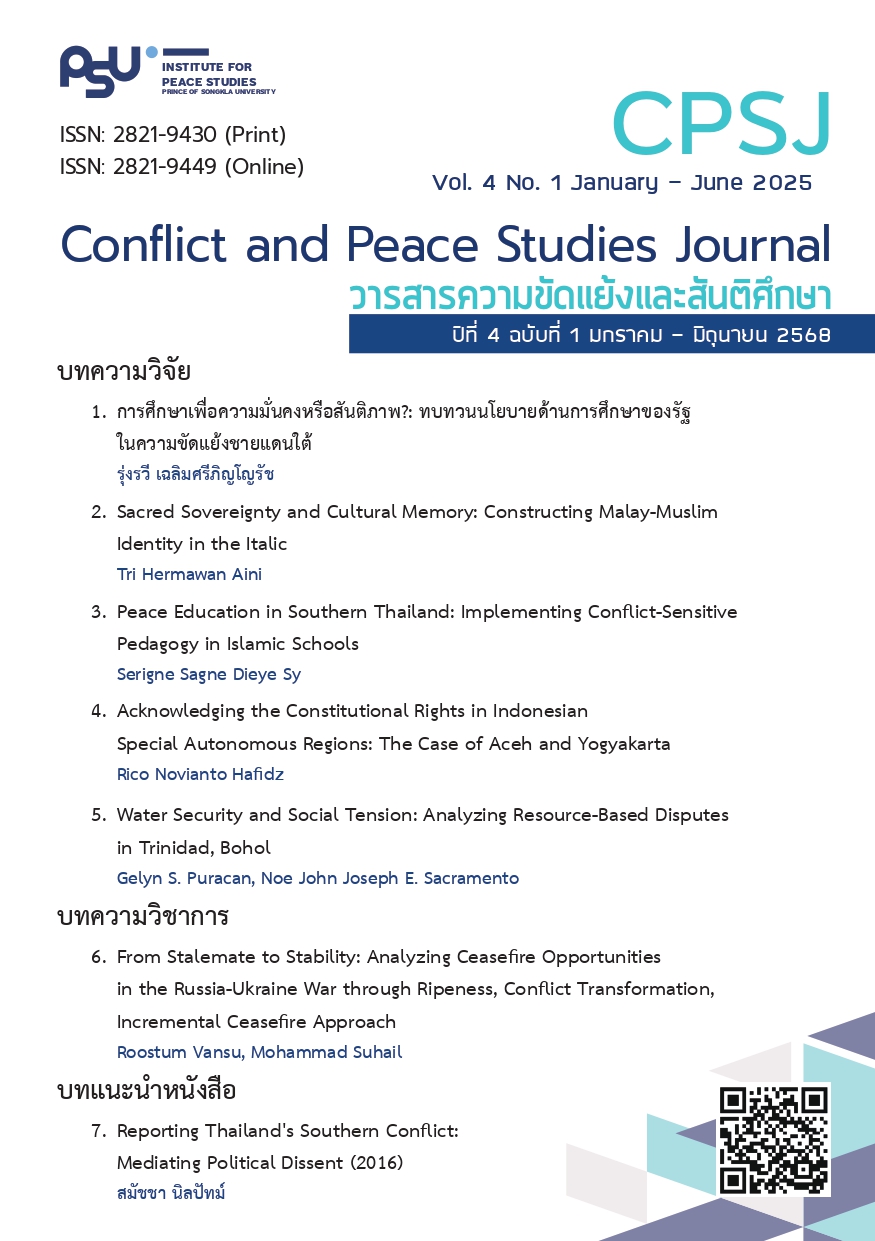Education for Security or Peace?: Rethinking the Thai State’s Education Policies in Conflict-Affected Southern Thailand
Main Article Content
Abstract
This paper critically examines education policies in the context of violent conflict in Thailand’s southern border provinces. Drawing upon Tejendra Pherali's Victim-Perpetrator-Liberator-Peacebuilder (VPLP) framework, this paper argues that, for the most part, education has either been a “victim” or acted as a "perpetrator," fuelling conflict rather than contributing to peacebuilding. Public schools have been targeted, and teachers have fallen victim to violence as the insurgents perceive them as agents of the state. The state has used education as an instrument to inculcate the sense of Thai nationhood and serve security purposes through the assertion of Thai language and Bangkok-centric Thai history. The importance of local language, history, and identities have been insufficiently recognised in educational programming. The situation has worsened after the 2014 coup, with military intervention in educational programming in the name of "education for security", drawing criticism from educators.
For education to be a key contributor to peacebuilding, the government must ensure genuine recognition of the plurality of ethno-religious identities in the education system. The recognition of cultural diversity and local histories, mother tongue-based multilingual education, the declaration of Malay Patani as a working language in southern Thailand and intercultural education are among the initiatives that could transform education into liberator/peacebuilders.
Article Details
References
Arphattananon, T. (2018). Multicultural Education in Thailand. Intercultural Education, 29(2), 149–163. Retrieved from https://doi.org/10.1080/14675986.2018.1430020
Centre for the Coordination and Administration of Education in the Southern Border Provinces. (2018). Phaen yutthasat kansueksa khet phatthana phiset chaphokit changwat chaidaen phaktai 20 pi. Songkhla: Centre for the Coordination and Administration of Education in the Southern Border Provinces.
Centre for the Coordination and Administration of Education in the Southern Border Provinces. (2020). Sangkhom phahu watthanatham changwat chaidaen tai: Laksut prawattisat thongthin changwat chaidaen phaktai. Songkhla: Centre for the Coordination and Administration of Education in the Southern Border Provinces.
Centre for Propelling Education in the Southern Border Provinces. (2024). Khomun sarasonthet pi-ngoppraman phoso 2566 khopkhet 5 changwat chaidaen phaktai [Unpublished raw data].
Chalermsripinyorat, R. (2019). The Shifting Battleground: Peace Dialogue in Thailand’s Malay-Muslim South. In M. J. Montesano, T. Chong, & M. Heng (Eds.), After the Coup: The National Council for Peace and Order Era and the Future of Thailand (pp. 140–169). ISEAS – Yusof Ishak Institute.
Chalermsripinyorat, R. (2024). Thailand. Counter Terrorist Trends and Analyses, 16(1), pp. 28–32.
Che Man, W. K. C. (1990). The Thai Government and Islamic Institutions in the Four Southern Muslim Provinces of Thailand. Sojourn: Journal of Social Issues in Southeast Asia, 5(2), 255–282. Retrieved from http://www.jstor.org/stable/41056800
Deep South Watch. (2024). Statistics of Violence [Unpublished raw data], made available to the author.
Harai, W. (2006, June 26). Gen Prem Rejects Key NRC Proposal. Bangkok Post.
Human Rights Watch. (2010). Targets of Both Sides (p. 13). Human Rights Watch. Retrieved from https://www.hrw.org/sites/default/files/reports/thailand0910webwcover.pdf
Keyes, C. F. (2019). Buddhist Kingdom as Modern Nation State. Routledge.
Khoromo kho nayobai phasa haeng chat tang 6 yutthasat samkhan chai phasa chuai khapkhluean setthakit. (2021, June 29). Matichon Online. Retrieved 9 April 2025 from https://www.matichon.co.th/politics/news_2802020
Lo Bianco, J. (2013). Language and Social Cohesion: Malaysia, Myanmar, Thailand (Conceptual Framework, 2013–2014 Work Plan). Submitted to UNICEF East Asia and Pacific Regional Office.
Lo Bianco, J., & Slaughter, Y. (2016). Recognizing Diversity: The Incipient Role of Intercultural Education in Thailand. In J. Lo Bianco & A. Bal (Eds.), Learning from difference: Comparative accounts of multicultural education (pp. 191–219). Springer.
Narongraksakhet, I., & Hajimasae, N. (2010). Thruesadi mai sathaban kansueksa Muslim changwat chaidaen phaktai. Songkhla: Salatan Research and Academics.
National Reconciliation Commission of Thailand. (2006). Aochana khwamrunraeng duai phalang haeng samanchan. Bangkok: National Reconciliation Commission of Thailand.
Office of the Prime Minister’s Office. (2021, 21 May). Rueang kho khwam henchop (rang) phaen pati bat kan dan nayobai phasa haeng chat (phoso 2564-2565). [Copy in possession of author].
Pathan, D. (2015, June 27). Bangkok Lacks the Will to Make Peace in Deep South. The Nation. Retrieved 9 April 2025 from https://www.nationthailand.com/perspective/30263252
Pherali, T. (2022). Conflict, Education and Peace in Nepal: Rebuilding Education for Peace and Development. Bloomsbury Publishing.
Pitsuwan, S. (1985). Islam and Malay nationalism: A Case Study of the Malay-Muslims of Southern Thailand (pp. 188–190). Thai Khadi Research Institute, Thammasat University.
The Senate Committee on Military and National Security. (2022). Kan thopthuan kitchakam kansueksa phuea khwam mankhong nai phuenthi changwat chaidaen phaktai. Bangkok: The Senate Committee on Military and National Security.
UNESCO. (2005). Convention on the Protection and Promotion of the Diversity of Cultural Expressions (Article 8). Retrieved from https://unesdoc.unesco.org/ark:/48223/pf0000142919
UNESCO. (2006). UNESCO Guidelines on Intercultural Education. UNESCO. Retrieved from https://unesdoc.unesco.org/ark:/48223/pf0000147878
UNICEF. (2014). Thailand Case Study in Education, Conflict and Social Cohesion. UNICEF East Asia and Pacific Regional Office.
UNICEF, & RILCA. (2018). Bridge to a Brighter Tomorrow: The Patani Malay-Thai Multilingual Educational Programme. UNICEF. Retrieved from https://www.unicef.org/thailand/reports/bridge-brighter-tomorrow

